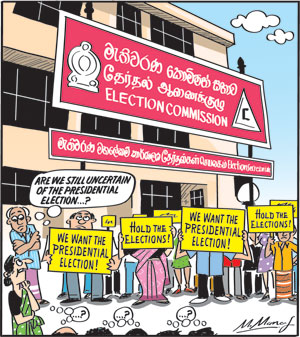Columns
Political uncertainties serious setbacks to economic recovery
View(s):Despite the Election Commission’s announcement that the presidential election will be held on September 21 and presidential aspirants are paying their deposits, some still doubt whether it will be held.
Consequences
Our political columns and news stories give the latest reports on the election. The postponement of the election would have dire consequences for the country. Even the President has said that the election must be held.
Social unrest
Will this uncertainty over the presidential election be cleared soon, or will the nation be in a political crisis leading to social upheaval and chaos?
2024
The first seven months of this year have seen strikes, work stoppages, and social unrest. The period was marked by political uncertainty that has been a serious setback to the economy. However, several macroeconomic indicators have shown an improvement, though the plight of the poor has worsened.
Poverty
Prices have risen, poverty and malnutrition have increased, health facilities have deteriorated, and there has been an unprecedented exodus of professionals and workers, weakening the country’s long-term economic and social development. This would impede the country’s long-term capacity for economic development.
Macroeconomic indicators
In the first six months of this year, the economy has grown by a modest amount; the rate of inflation has dipped, though prices have risen; revenue collection has increased; interest rates have fallen; the balance of payments has improved; and external reserves have risen.
Reversal
All these favourable indicators could see a severe setback if the confusion as to whether there would be a presidential election continues. Furthermore, there is speculation whether parliament would be dissolved and a general election too would have to be held but cannot be held for whatever reasons. The consequent chaos and possible bloodshed would ruin the economy.

Post elections
Even if the presidential election is held on schedule, there is no certainty of the election of a president. In the current political context, no candidate is likely to get over 50 percent of the popular vote, even after counting the second preference votes.
Stalemate
How such a stalemate could be resolved is unclear. The consequent political crisis could lead to chaos. A political stalemate would paralyse the economy. It would be a massive economic disaster.
Economic disruption
It appears that whatever happens, the country is heading for a period of political uncertainty that could be a massive economic disruption. Hopefully, the outcome of the presidential polls will be decisive. A president with a majority in parliament is a prerequisite for economic stability and growth. Furthermore, pragmatic economic policies and their effective implementation are imperative.
Economic policies
There are questions about the economic policies that would be pursued by a new regime. Pre-election promises and vague aspirations are not pragmatic policies. Opposition parties have promised a transformation in the economy that would improve the living conditions of the poor. Both the JVP-led NPP and the SJB have vowed to renegotiate the arrangement with the IMF. This may prove difficult.
New president
The paramount questions are who would be president, which party or coalition would have a majority in parliament, and what economic policies would be pursued. Hopefully, 2025 will be a year of political stability conducive to economic stability and growth.
Expectation
Yet, it is difficult to predict post-election political stability, especially as the presidential election is not likely to result in any candidate receiving over 50 percent of the vote even after a count of the second preference. The three front runners are NPP leader Anura Kumar Dissanayake, SJB leader Sajith Premadasa, and the incumbent president, Ranil Wickremesinghe, who is contesting the election as an independent candidate.
Economic policies
Broadly, the three main parties have different policies. The policies of Ranil Wickremesinghe are predictable. They would be “more of the same”. One could characterise his policies as centre-right market-oriented policies. His ‘independent coalition’ would implement the conditions of the IMF, except perhaps the governance reforms that may be partially met.
SJB
The SJP could be characterised as a centrist with market-oriented and welfare policies. The NPP’s economic policies are less predictable. They are certainly a left-oriented party whose policies on the role of the state remain to be seen. Their international leanings are towards communist countries, and domestic policies are likely to be state-dominated. However, they have said that they would follow market-friendly policies and allow private enterprise even in education, except medical education.
Future
The next five months of this year are likely to be one of confusion and economic dislocation. Hopefully, the popular expectation would be a period of least economic turbulence and that too for a short duration and a stable government with pragmatic policies and a capacity for effective administration and implementation.
Conclusion
The plain truth is that there is little prospect of a stable government pursuing realistic economic policies and being able to make the hard decisions to stabilise the economy and get people to work. A stable government pursuing effective economic policies and reducing corruption are vital for economic development.
Buying or selling electronics has never been easier with the help of Hitad.lk! We, at Hitad.lk, hear your needs and endeavour to provide you with the perfect listings of electronics; because we have listings for nearly anything! Search for your favourite electronic items for sale on Hitad.lk today!


Leave a Reply
Post Comment